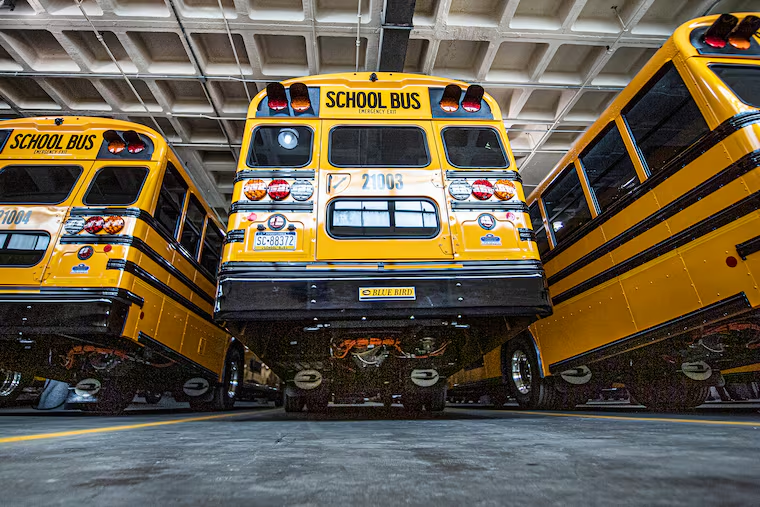Electric school buses are coming to the Philly School District, which plans to replace its diesel fleet in 10 years
Electric buses have a higher price tag than diesel buses — $365,000 per bus compared to $150,000. But they save money in the long run.

Electric school buses will soon begin rolling on city streets as the Philadelphia School District starts the process of greening its transportation fleet.
The school system has purchased five electric buses and ordered six more. The 11 electric buses, which will begin carrying students this spring and summer, represent less than 1% of the district’s fleet of buses.
“We understand the impact that gas emissions has on student health and we’re committed to leading the way to reducing emissions to positively impact health and wellness in our communities,” Superintendent William R. Hite Jr. said Friday at a news conference at the district’s North Broad Street garage.
» READ MORE: 98% of Philly schools tested in a new study had some lead-containing water; district disputes findings
The district has set a goal of ridding itself of diesel-guzzling buses within 10 years; it will use a combination of grants and capital dollars to replace the fleet eventually, said Reggie McNeil, chief operating officer.
Electric buses have a higher price tag than diesel buses — $365,000 per bus compared with $150,000. But they save money in the long run, said Teresa Flemming, executive director of transportation services. She estimated each will save the district about $5,000 annually. Once the entire fleet is electric, the district will save between $1 million and $1.5 million annually on fuel costs, officials estimate.
The district will also launch a project to examine the actual environmental impact of the project, putting instruments to measure outdoor air quality around two electric and two diesel buses. The devices will record the amount of particulate dust and nitrogen dioxide every one to three minutes. District and city officials will have access to the data, which will eventually be available to district educators for teaching purposes, too.
“We know that electric is the future, and we look forward to having data-driven evidence for the importance of investing in all electric buses,” said Flemming.
The buses, plugged into charging stations at the district garage, will be able to complete a full day’s run of 80 to 100 miles without needing to be recharged.
It’s been a tough year for the district’s transportation services department, which has been hit particularly hard by a driver shortage. As a result, school bus service has been spotty; some students guaranteed rides by the district have been left to find their own way to school.
McNeil said the district was on its way to whittling down its list of driver vacancies, which once hovered at 97 unfilled jobs. It has at least 42 drivers in the pipeline, McNeil said.
» READ MORE: Philly’s bus driver shortage is a ‘crisis,’ leaving kids missing school or stranded
The district employs 223 drivers total.
Officials at the news conference also responded to a recent report that found that 61% of school water sources tested by the district contained lead, and 98% of tested schools had some lead-containing water.
McNeil and Steve Link, the director of environmental management, suggested the district’s current level of compliance is sufficient, and stressed that the district shuts off fountains and other water sources where testing reveals levels of lead over the 10-parts-per-billion mark — the limit set by city law.
The report, by PennEnvironment Research and Policy Center, the Black Church Center for Justice and Equality, and PennPIRG Education Fund, noted that organizations including the American Academy of Pediatrics say that no amount of lead is safe in drinking water.
The advocates call for the removal of all drinking fountains, replacing them with hydration stations. The district currently has about 1,300 hydration stations, but educators say that some schools do not have enough hydration stations, and some hydration stations don’t have functioning filters.